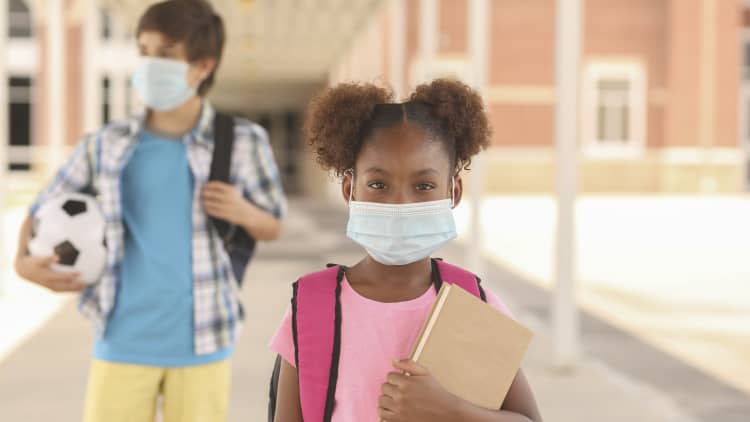For parents who have yet to send their children back to school, the decision whether to opt-in for some in-classroom attendance or choose to do remote learning full-time can be agonizing.
Many parents are still unsure which route is best: 63% of parents say they do not have a clear game plan for their children's schooling or care this fall, according to a new survey of 1,000 parents that digital health company Maven Clinic conducted in conjunction with Wakefield Research at the end of July. About 15% of parents say they still have absolutely no idea what they're going to do about school and child care.
But a new quiz launched Wednesday may be able to clarify which option would work best for your family. The free assessment, developed by Maven, allows parents to walk through some of the biggest issues they may have heading into the fall, as well as weigh the pros and cons of in-person versus remote learning.
"A lot of parents are having the same kind of experience where they just keep revisiting the question [of schooling] over and over and over again, but without quite figuring out," economist and parent Emily Oster tells CNBC Make It. "The uncertainty about what is going to happen is really driving a lot of our anxiety."
How the interactive childcare decision tool works
Parents looking for guidance can head to Maven Clinic's website or the Maven app to take the assessment.
The quiz asks parents if they agree or disagree with 10 statements, including if they have anyone in their household who is at a higher risk contracting Covid-19, how schoolwork would be accomplished at home and if they'd need to take public transportation to get to school or daycare.
Based on their answers, Maven then shows parents which option seems to make more sense for them, as well as side-by-side lists of risks and benefits for both in-school and remote learning. By sending kids back to school in-person, for example, a benefit may be that kids get more social development, but a risk may be that it's harder to control a family's exposure to the virus.
The tool also gives parents the option for a "gut check" to make sure that they're comfortable with the option that the assessment showed may fit their needs and preferences best.
"When we make a decision, we're used to being like, OK, I'm happy with that decision — I feel like that was the right choice," says Oster, who helped develop the tool. But amid the pandemic, it can feel like there are no choices that you're happy with. Instead, it may help to at least know that you can arrive at a decision in a thoughtful and measured way, Oster says.
Maven's tool helps frame the conversation for parents, Oster says. "A lot of people are approaching this with the question: What should I do? It's pretty vague as opposed to: What are the things I could realistically do?" she says. To help, the tool guides users through thinking about the most practical approach for their family.
The tool also provides resources for parents, including health care appointments with Maven, child-care referral sites and data and research on the latest Covid-19 developments and infection rates in your state.
Don't miss more in this series:
- Lack of school and child care could mean losing 'a generation of working parents
- 'No solid answers': The scramble to reopen schools leaves teachers with concerns
- 'I am definitely panicking'— Parents say school reopening plans leave them without any good options
- Only 32% of companies returning to work have plans for employees' child-care needs even as many schools postpone reopening full-time
- My preschool closed and now I'm looking at schools with tuition over four times what I was paying



